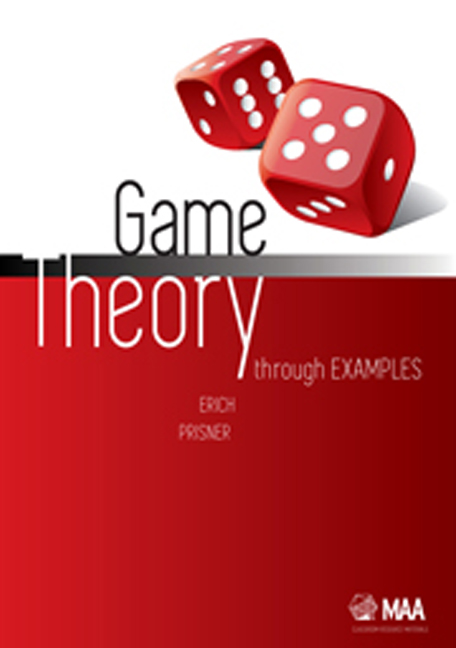Book contents
- Frontmatter
- Contents
- Preface
- 1 Theory 1: Introduction
- 2 Theory 2: Simultaneous Games
- 3 Example: Selecting a Class
- 4 Example: Doctor Location Games
- 5 Example: Restaurant Location Games
- 6 Using Excel
- 7 Example: Election I
- 8 Theory 3: Sequential Games I: Perfect Information and no Randomness
- 9 Example: Dividing A Few Items I
- 10 Example: Shubik Auction I
- 11 Example: Sequential Doctor and Restaurant Location
- 12 Theory 4: Probability
- 13 France 1654
- 14 Example: DMA Soccer I
- 15 Example: Dividing A Few Items II
- 16 Theory 5: Sequential Games with Randomness
- 17 Example: Sequential Quiz Show I
- 18 Las Vegas 1962
- 19 Example: Mini Blackjack and Card Counting
- 20 Example: Duel
- 21 Santa Monica in the 50s
- 22 Theory 6: Extensive Form of General Games
- 23 Example: Shubik Auction II
- 24 Theory 7: Normal Form and Strategies
- 25 Example: VNM POKER and KUHN POKER
- 26 Example: Waiting for Mr. Perfect
- 27 Theory 8: Mixed Strategies
- 28 Princeton in 1950
- 29 Example: Airport Shuttle
- 30 Example: Election II
- 31 Example: VNM POKER(2, r, m, n)
- 32 Theory 9: Behavioral Strategies
- 33 Example: Multiple-Round Chicken
- 34 Example: DMA Soccer II
- 35 Example: Sequential Quiz Show II
- 36 Example: VNM POKER(4, 4, 3, 5)
- 37 Example: KUHN POKER(3, 4, 2, 3)
- 38 Example: End-of-Semester Poker Tournament
- 39 Stockholm 1994
- Bibliography
- Index
18 - Las Vegas 1962
- Frontmatter
- Contents
- Preface
- 1 Theory 1: Introduction
- 2 Theory 2: Simultaneous Games
- 3 Example: Selecting a Class
- 4 Example: Doctor Location Games
- 5 Example: Restaurant Location Games
- 6 Using Excel
- 7 Example: Election I
- 8 Theory 3: Sequential Games I: Perfect Information and no Randomness
- 9 Example: Dividing A Few Items I
- 10 Example: Shubik Auction I
- 11 Example: Sequential Doctor and Restaurant Location
- 12 Theory 4: Probability
- 13 France 1654
- 14 Example: DMA Soccer I
- 15 Example: Dividing A Few Items II
- 16 Theory 5: Sequential Games with Randomness
- 17 Example: Sequential Quiz Show I
- 18 Las Vegas 1962
- 19 Example: Mini Blackjack and Card Counting
- 20 Example: Duel
- 21 Santa Monica in the 50s
- 22 Theory 6: Extensive Form of General Games
- 23 Example: Shubik Auction II
- 24 Theory 7: Normal Form and Strategies
- 25 Example: VNM POKER and KUHN POKER
- 26 Example: Waiting for Mr. Perfect
- 27 Theory 8: Mixed Strategies
- 28 Princeton in 1950
- 29 Example: Airport Shuttle
- 30 Example: Election II
- 31 Example: VNM POKER(2, r, m, n)
- 32 Theory 9: Behavioral Strategies
- 33 Example: Multiple-Round Chicken
- 34 Example: DMA Soccer II
- 35 Example: Sequential Quiz Show II
- 36 Example: VNM POKER(4, 4, 3, 5)
- 37 Example: KUHN POKER(3, 4, 2, 3)
- 38 Example: End-of-Semester Poker Tournament
- 39 Stockholm 1994
- Bibliography
- Index
Summary
In the 50s and 60s, Las Vegas was different from what it is now. In the 50s it still had a Wild West flavor: No carpets, no dress code, cowboy boots and hats worn in the casinos. In the 60s, when the Mafia took over many of the casinos, those on the strip became more elegant. Alcohol, illegal drugs, and prostitution were never far away, nor were cheating and violence.
Las Vegas then was a world far away from the academic world except for some mathematicians' interest in gambling. As discussed in Chapter 13, Probability theory started from questions about games of luck. Games of skill were discussed in Zermelo's paper on chess [Z1913], and in papers on simplified versions of poker by Borel, von Neumann, and Kuhn [K1950]. From then on, games, in most cases simplified, were taken as examples of simple games. Mathematicians, in particular the young Princeton graph theorists John Nash, Martin Shubik, Lloyd Shapley, and others played various games as Go, Hex, Kriegsspiel, extensively. Although the games are usually too complex for a complete analysis, their attractiveness for mathematicians may lie in the fact that there is no modeling necessary. The rules are firm, and the payoffs are given.
Most professional gamblers of that time were far away from the academic world, and they were not interested in what insight professors had to offer. The only mathematics they believed to be useful were the very simple comparison of odds and payoff ratio, which was standard and distinguished professional gamblers from the so–called “suckers”. Many gamblers played in casinos and bet on sports events like horse racing. Their expertise was not in mathematics but in the sports involved–the key was to estimate the odds correctly.
- Type
- Chapter
- Information
- Game Theory Through Examples , pp. 135 - 138Publisher: Mathematical Association of AmericaPrint publication year: 2014



